|
|
|
Sort Order |
|
|
|
Items / Page
|
|
|
|
|
|
|
| Srl | Item |
| 1 |
ID:
172250
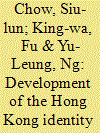

|
|
|
|
|
| Summary/Abstract |
This study deployed a systematic method to develop and validate a measurement for the identity of Hong Kong people, reflecting the emerging localistic attitude in the city. Drawing on a two-dimensional identity model, a combination of cultural and civic domains, an operationalization for Hong Kong identity was derived to differentiate between ‘HongKongese’ and others with stronger Mainland-Chinese-oriented identity. Cultural attribute, such as language and choice of technology products, is found to be of paramount importance in identity confirmation. Anti-authoritarianism and proactive political participation are the two major discriminatory features in the civic domain. Social distance from Mainland Chinese is positively associated with these key components of the scale, supporting the scale’s construct validity and confirming the nativist tendency of certain groups of Hong Kong localists.
|
|
|
|
|
|
|
|
|
|
|
|
|
|
|
|
| 2 |
ID:
183849
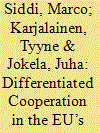

|
|
|
|
|
| Summary/Abstract |
European Union (EU) treaties have introduced legal frameworks for differentiated integration in European foreign and security policy, but they have rarely been used. Instead, member states have engaged in informal practices of differentiated cooperation. Based on an analysis of effectiveness, accountability and legitimacy of differentiated cooperation in the Western Balkans, the Middle East Peace Process, negotiations on Iran’s nuclear programme and the Ukraine crisis, we argue that differentiated cooperation has had positive outcomes when it has adhered to common EU values and positions. When this has not been the case, differentiation has undermined EU foreign and security policy.
|
|
|
|
|
|
|
|
|
|
|
|
|
|
|
|
| 3 |
ID:
183852
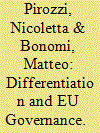

|
|
|
|
|
| Summary/Abstract |
Existing literature on differentiated integration has made an important contribution in theorising and operationalising its regulatory dimension. However, in order to fully evaluate the impact of differentiation on EU governance, this approach needs to be enriched with additional elements. The organisational element allows us to grasp the different forms, venues and actors of differentiation. The constitutional element connects the different forms of differentiation to the foundations of EU constitutionalism and identity. The socio-political element goes beyond the analysis of differentiation as a policy practice and qualifies it as a policy choice. On this basis, a generalisation is proposed resulting from a comparative analysis of a wide range of contributions in different policy sectors in order to assess differentiation in the EU’s governance against three main criteria: effectiveness, sustainability and accountability/legitimacy.
|
|
|
|
|
|
|
|
|
|
|
|
|
|
|
|
| 4 |
ID:
116687
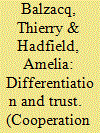

|
|
|
|
|
| Publication |
2012.
|
| Summary/Abstract |
One recent but major policy occurrence in Justice and Home Affairs - the Treaty of Prüm (2005) - has developed within the framework of differentiated integration, thus reopening the debate over the impact of flexibility on EU integration, what causes it, and whether it should be sought by Member States at all. Whatever the consensus, the debate itself demonstrates that the very idea of differentiated integration deserves a renewed attention today ultimately because it affects, in one way or another, the performance of the EU. This article presents a critical analysis of the practice of differentiation in Justice and Home Affairs, by examining its forms, principles and effects. It discusses the literature on the subject, emphasizing the complexity of flexible integration, but reaches different conclusions. Thus, in contrast to the dominant argument, we argue that differentiation is not necessarily about deepening and/or widening EU integration. It is also, and sometimes primarily, about power and interests, two major elements that feed mistrust among Member States. In fact, we demonstrate that mistrust can cause poor differentiation. Moreover, in the absence of trust among Member States, flexibility might contribute to sub-optimal policies. Based on past research and interviews, we substantiate our claim by investigating the driving factors, rationales and consequences of the Treaty of Prüm on the institutionalization of a EU area of Freedom, Security and Justice.
|
|
|
|
|
|
|
|
|
|
|
|
|
|
|
|
| 5 |
ID:
110831
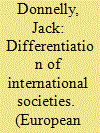

|
|
|
|
|
| Publication |
2012.
|
| Summary/Abstract |
Taking off from a recent article in this journal by Barry Buzan and Mathias Albert, I present a framework of structural differentiation as an alternative to IR's standard tripartite conception of the elements of structure. Rather than employ ideal type models, though, as Buzan and Albert do, I present a more open-textured, multidimensional account of differentiation. I also emphasize the systemic nature of structural analysis. The elements of structure are interdependent parts of wholes (systems) - not the independent variables implied by standard formulations such as 'the effects of anarchy'. A multidimensional systemic approach directs our attention to the diversity of and change in international systems and their structures, which mainstream structural IR typically ignores or obscures. I illustrate both the regularity of extensive structural change and the analytical utility of my differentiation framework with case studies of post-World War II international society and contemporary processes of globalization.
|
|
|
|
|
|
|
|
|
|
|
|
|
|
|
|
| 6 |
ID:
191919
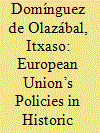

|
|
|
|
|
| Summary/Abstract |
Most analyses of European Union (EU) policies relating to the Israeli-Palestinian conflict do not question the epistemological framework on which these policies are based. The 1967 paradigm preferred by the EU does not address the inalienable rights of all Palestinians but rather focuses exclusively on a particular group, those Palestinians living in the Gaza Strip and the West Bank, territories that have been under Israeli occupation since 1967. This focus ignores (or at most leaves in a second place) the rest of the Palestinian people: both 1948 Palestinians and the Palestinian diaspora, whose rights are part and parcel of the question of Palestine. This article examines how the EU bases its policies on different kinds of securitisation concerning distinct Palestinian communities. It does so through a two-step securitisation process that frequently rubber-stamps Israel’s narrative of securitisation. This compartmentalising program ultimately is complicit with Israel’s ‘divide and rule’ strategy and settler-colonial mechanisms, contributing to the deepening of Palestinian fragmentation. Moreover, it renounces exploring alternative proposals and paradigms that consider the rights of the Palestinian people as a whole and envisages decolonisation as the desired outcome.
|
|
|
|
|
|
|
|
|
|
|
|
|
|
|
|
| 7 |
ID:
190068


|
|
|
|
|
| Summary/Abstract |
This article focuses on the use of experimental differentiation, a form of small-scale pilot program that aims at testing whether further institutional integration can be bolstered in an area where cooperation has not been tested or proven. Experimental differentiation consists of three features. Firstly, participation should not be constrained by membership in the European Union. Secondly, experimental differentiation should consist of short-term projects. Thirdly, the functional scope of such experiments should be clearly limited to reduce the expected political costs of participation. Empirically, this article focuses on the EU Battlegroups and analyzes how the above-mentioned features drove political actors to support participation. While EU Battlegroups have been criticized for their lack of effective action and the political and financial costs they entail, this article offers a more positive feature, arguing that Battlegroups should be seen as experiments that lead reluctant political actors to consider their cooperation under the EU framework.
|
|
|
|
|
|
|
|
|
|
|
|
|
|
|
|
| 8 |
ID:
190069
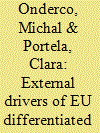

|
|
|
|
|
| Summary/Abstract |
Since its establishment, the Common Foreign and Security Policy (CFSP) has strived to increase convergence among EU member states. Yet, convergence remains elusive and scholars have started to explain the emergence of differentiated cooperation resulting from multiple internal EU crises. We posit that the convergence in the EU member states with respect to nuclear weapons has been fundamentally altered by the humanitarian turn to nuclear disarmament. This has led to a crystallization of differentiated subgroups among the member states, whose membership coincides with that of informal groupings active in the broader nuclear nonproliferation regime. Combining quantitative data on resolution sponsorship at the Non-Proliferation Treaty review process and voting at the UN General Assembly, we show that significant change in the international nuclear nonproliferation regime led to differentiated cooperation within the CFSP, resulting in two cohesive subgroups of member states.
|
|
|
|
|
|
|
|
|
|
|
|
|
|
|
|
| 9 |
ID:
075768
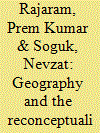

|
|
|
| 10 |
ID:
183843


|
|
|
|
|
| Summary/Abstract |
We present here the key theoretical underpinnings and general approach of the Special Issue “Governing Differentiation and Integration in the European Union: Patterns, Effectiveness and Legitimacy”, which collects contributions of a group of experts and scholars from the Horizon 2020 EU IDEA – Integration and Differentiation for Effectiveness and Accountability project. The key concepts for the analysis are clarified, namely differentiation, differentiated integration, effectiveness, legitimacy and sustainability. The basic claim of the Special Issue is that differentiation is not only necessary to address current challenges more effectively by making the Union more resilient and responsive to citizens. By introducing a useful degree of flexibility in the complex EU machinery, differentiation is also desirable, so long as such flexibility is compatible with the core principles of EU constitutionalism and identity, sustainable in terms of governance and acceptable to EU citizens, member states and affected third partners.
|
|
|
|
|
|
|
|
|
|
|
|
|
|
|
|
| 11 |
ID:
190065
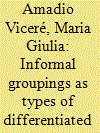

|
|
|
|
|
| Summary/Abstract |
Although informal groups of member states often steer EU foreign policy, existing scholarly literature does not offer an overarching theoretical approach to account for their causes and their different types. This article conceptualizes informal groupings and offers a theoretical approach that explains their occurrence in EU foreign policy. It claims that while disagreements among member states and the lack of EU capacity are the main causes of informal groupings, the combination of these two factors over time and across different policy issues determines the emergence of specific types of informal groupings in EU foreign policy. Indeed, evidence from Kosovo, Libya, and Syria shows that different types of informal groups addressed various policy issues by replacing, complementing and/or supporting corresponding EU policies. Nonetheless, as these groupings lack central guidance and accountability mechanisms, they are not a panacea for EU foreign policy.
|
|
|
|
|
|
|
|
|
|
|
|
|
|
|
|
| 12 |
ID:
077399


|
|
|
|
|
| Publication |
2007.
|
| Summary/Abstract |
A large majority of studies on differentiated integration focus their attention on closer or enhanced cooperation in the EU, neglecting similar developments in other regions, for example, the pathfinder in APEC. In comparing enhanced cooperation in the EU with the pathfinder in APEC, this article aims to discover conditions under which ideas of differentiation can emerge and then be transformed into common policies endorsed by all member states in regional integration. It shall also make clear the reasons why the pathfinder has been applied in APEC while enhanced cooperation has never been used in the EU. It will begin with a detailed categorization of sub-integrations. Then, the author comparatively analyzes the developments of enhanced cooperation in the EU and the pathfinder in APEC, and as a conclusion, evaluates the contribution of this analysis to better understanding of differentiation
|
|
|
|
|
|
|
|
|
|
|
|
|
|
|
|
| 13 |
ID:
193017
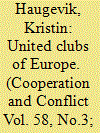

|
|
|
|
|
| Summary/Abstract |
This article makes the case for integrating informal, social and minilateral dynamics in analyses of ‘differentiated integration’ in the European Union (EU) context. In EU studies, differentiated integration has mainly served as an analytical lens for studying variation in states’ degree of formalized commitment to the European integration project or in organizational decision-making procedures across policy areas. While this focus has generated important analytical and empirical insights, three dimensions tend to be lost when limiting the study of differentiated integration to negotiated outcomes manifest in legal documents and decision-making procedures. First, informal processes of integration precede and concur with formal ones. Second, European integration is an inherently social process, and member states integrate with the EU identity-building project in different ways and to different degrees. Third, member states enjoy heterogeneous social ties with one another, routinely forming informal bi- and minilateral coalitions in everyday decision-shaping processes. More knowledge about these informal and social dynamics can give us a better understanding of how differentiated integration manifests itself in practice and where the European integration process is heading. The theoretical argument is buttressed by data from the 2020 European Council of Foreign Relations’ ‘Coalition Explorer’ survey, showing how partner preferences within the EU continue to reflect stable social sub-orders.
|
|
|
|
|
|
|
|
|
|
|
|
|
|
|
|
| 14 |
ID:
092040
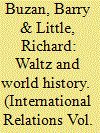

|
|
|
|
|
| Publication |
2009.
|
| Summary/Abstract |
This article provides a critique of Waltz's work from the perspective of world history. It shows how Waltz's commitment to a highly parsimonious theoretical approach paradoxically both sets up the possibility of his theory being universally applicable, and undermines its prospects as a viable approach to understanding world history. Using the key concepts from Waltz's work - units, systems, structure, process - we show the detailed grounds on which his theory fails to apply to such large swathes of time and place, so that its claims to universality fall, even though it can usefully be applied to some times and places. We also show its shortcomings in relation to the essential historical task of periodization. We argue that international relations needs to engage more with world history, and that the task of doing so will fall to approaches other than Waltz's.
|
|
|
|
|
|
|
|
|
|
|
|
|
|
|
|
|
|
|
|
|